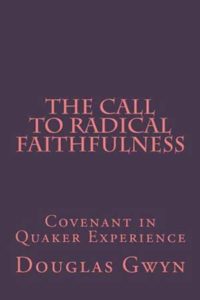The Call to Radical Faithfulness: Covenant in Quaker Experience
Reviewed by Steve Chase
February 1, 2018
 By Douglas Gwyn. Plain Press, 2017, 104 pages. $10/Paperback; $5/eBook.
By Douglas Gwyn. Plain Press, 2017, 104 pages. $10/Paperback; $5/eBook.
Buy from QuakerBooks
In this inspired collection of short essays, sermons, and half-hour talks on the Bible, Quaker pastor and historian Doug Gwyn highlights an important truth about Liberal Quakerism today. According to Gwyn, our current status as a tiny, theologically jumbled, post-Christian, religious sect that hopes against hope for peace is a far cry from what we used to be: a rapidly growing, revolutionary, spiritual movement of friends and followers of Jesus who threatened to turn the world upside down with a powerful vision of radical faithfulness.
In The Call To Radical Faithfulness, Gwyn offers us a glimpse into this very different Quaker world by boiling down his many scholarly books on the “radical Christian faith of early Friends” to 104 pages of accessible stories and inspired ministry about both famous early Quakers, like George Fox and Margaret Fell, and lesser-known early Friends, such as James Parnell and Sarah Blackborrow. Each of these stories shines a light on the depth of the early Friends’ mystical and life-changing encounter with the Spirit of God, the very Spirit they believed inspired the life and ministry of Jesus, as well as “the prophets and apostles of the Hebrew and Christian Scriptures.” The early Friends, according to Gwyn, “began living the biblical stories as their own story.”
This is a rarity among Liberal Friends today, and may be why much of modern Quakerism seems so muted and tame. Many Liberal Friends are disinterested or ignorant of the Bible and see the main characteristic of modern Quakerism as a mysticism cut-off from the collective responsibilities and historic mission of the prophetic religious tradition. As Gwyn notes, from the perspective of early Friends and the most faithful Friends today:
Quaker faith and practice is a prophetic spirituality…. Like mysticism, it is grounded in firsthand experience. But that experience leads us to speak and act in the world, not simply to enjoy a sense of oneness with God and everything.
Another difference between then and now is that early Friends embraced social conflict, instead of fearing it and hoping it would go away. As Gwyn points out, they fought to win what they called “the Lamb’s War” for the Peaceable Kingdom. In this struggle, they used the nonviolent revolutionary means of protest, noncooperation, and disruptive interventions in social life. While they refused to wage the Lamb’s War through the use of carnal weapons; violent conspiracies; or even dishonest, behind-the-scenes parliamentary maneuvering, they were not quietist, “nice,” or hesitant to challenge authority or take sides in a social conflict between the oppressed and the powerful. That cultural shift among Friends came later.
Early Friends were much more radical and rebellious than most of us are today: both in their social vision of the Peaceable Kingdom and in their chosen means of fostering their social revolution. Gwyn actually finds it ironic that most Quakers in the twentieth century had to learn about nonviolent direct action for social justice from Gandhi and King, when it was a central part of the faith and practice of early Friends in the mid-1600s.
In drawing lessons for today, Gwyn is wise not to say that deepening radical faithfulness will require us simply to rekindle the visionary and nonviolent revolutionary fighting spirit of early Friends. While this is true, he suggests we also need to avoid reproducing how early Friends misread the signs of their times and held fevered delusions of achieving a quick and total victory in the Lamb’s War. This delusion led many early Friends to give up their spiritual vocation as nonviolent revolutionaries in despair and settle instead for a quietist “hedge against the world” approach to spiritual life, if only the government would grant them religious toleration and end its violent repression of them.
I do have one disagreement with Gwyn. In this book, Gwyn agrees with James Nayler, one of the most revolutionary of early Friends, who said we should not know what we are going to do on any given day and we should not “compass a kingdom to power over sin.” By this, Nayler (and Gwyn) means that if we are to “live faithfully,” we should not seek to be strategic: carefully building coalitions with our neighbors or setting our objectives thoughtfully. This is the one off-note in this otherwise profound and wise book.
Given the failures of early Friends as faith-based, nonviolent revolutionaries, it might be wise to learn as well from more strategic, prophetic revolutionaries like Gandhi, King, and Doloros Huerta.



Comments on Friendsjournal.org may be used in the Forum of the print magazine and may be edited for length and clarity.